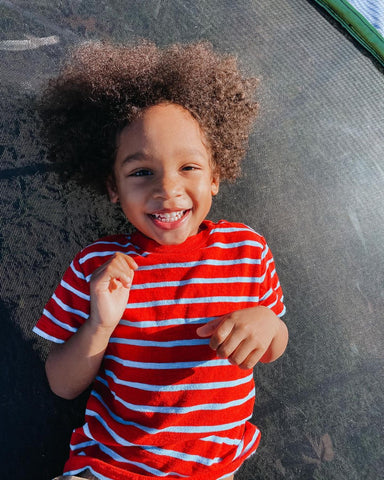The FAQs of Life: Autism Acceptance Month
As part of our "FAQs of Life" series, we hear from two moms who have children on the Autism spectrum.

Q: What were some of the things you noticed in your child's behavior that made you want to get help?
Jessie's answer: I actually didn’t notice anything. I thought my son Jackson (now 4.5) was a late talker and my husband Matt had a feeling something was different. Standard milestones would have had Jackson speaking at least ten words by 18 months, but he was still babbling, with no word formations.
Stefanie's answer: We knew Lilly (now 8) was a bit unique, shortly after birth. Starting as a teeny tiny baby, she avoided eye contact with the person holding her, preferred to lay down for comfort instead of being held, wasn’t a fan of eating or sleeping at all, and couldn’t stand being confined in her car seat or an infant carrier. She didn’t babble or say words as she started to grow, didn’t respond to her name or loud sounds, didn’t handle outings well, flapped her arms and whole body when she was happy or excited, and other things like that. We started talking to her pediatrician about what we should do to help her at about eight months old and he had us start with a brain stem scan (BAER) hearing test at ten months old. As soon as they told us that her ability to hear was perfectly fine, we knew she was autistic, and started the official evaluation process. She was diagnosed at 14 months.
Q: Are there any specific therapies they receive that have helped?
Jessie's answer: Jackson has received Speech therapy, ABA Therapy, and Occupational Therapy for over two years. He was also in public school in a special education classroom for a few months before COVID. We have all intentions of sending him back in the Fall.
Stefanie's answer: Lilly is currently homeschooled, which started because of the pandemic, but is continuing due to her major successes! Prior to the pandemic, she was enrolled at a beautiful private school, and just recently started going back just a few hours a week to play in the sensory gym and hang out with other children. We still plan on doing as much homeschooling as possible though, because she is thriving in a one-on-one environment. Lilly currently gets Speech Therapy once a week and Occupational Therapy once a week, but we mostly work on all her goals at home. Someday we hope to get additional Speech & Occupational Therapy, as well as start attending gymnastics again.
Q: Can you talk about some of the assistive technologies they use and how they’re helpful?
Jessie's answer: YES! Jackson has been using a Speech Device for under a year. With it, we’ve had multiple breakthroughs! While he’s still primarily non- verbal, he’s taken to a few phrases where he can communicate without his board. It takes A LOT of practice and repetition (and stimming), but we’re very grateful to have it!
Stefanie's answer: The combination of Autism and Apraxia makes vocal communication extra challenging for Lilly. We didn’t want to delay her ability to communicate by banking on vocal speech, so we bought Lilly an AAC (communication device) before turning three. Her AAC is an iPad loaded with an app called Proloquo2Go and it is AMAZING! With her AAC, she was able to communicate her wants and needs at a young age simply by pushing buttons, which has limited her frustrations so much. We also have the app loaded on our iPhones, so she can easily communicate at all times no matter where her dedicated device may be. About 8 months ago, Lilly started saying vocal words and sentences, but still uses her AAC daily too. We firmly believe that Lilly has a right to communicate in any way she is most comfortable, at any time, so we always plan on having her AAC device (and anything else she needs) ready and available for her.
Q: Do they have any sensory aversions?
Jessie's answer: Not necessarily aversions but preferences, yes. With his SPD (sensory processing disorder), we’ve learned his thing is proprioceptive input, meaning he needs to feel himself in space. He needs the freedom to run and jump, so we allow and encourage his movement with open space and trampolines to stim with.
Stefanie's answer: Lilly has sensory aversions to most clothing. She can’t stand tags, seams, scratchy material, varying sleeve or pant levels, or embellishments. As she grew taller, it became difficult to find sensory friendly clothing…until we found Primary! She practically wears it head to toe on a daily basis.
Lilly is also sensitive to loud voices and especially the sounds of crying children or babies. She also has challenges with loud sounds or songs, but only the songs or sounds she doesn’t choose. When she is playing her own music, or is making the sounds she expects to hear, then the sound level does not bother her as much. What’s interesting about her sound aversions is that one of our first clues that she had Autism was her lack of response to loud sounds altogether. Now she has sensory aversions to certain sounds. It just goes to show how much children can grow and change each year.
Q: What are some of their favorite things?
Jessie's answer: He loves jumping on the trampoline, watching snippets of music videos on repeat, running free anywhere, and jumping off of things. Basically anything that involves free movement.
Stefanie's answer: Lilly LOVES Elmo and Sesame Street! She watches clips of Sesame Street shows in many languages, is drawn to all the books, and has about 50 Sesame Street plush characters (and loves every single one). She also loves technology like iPads and computers, looking at old photos and videos, and is at her happiest playing outside – jumping, swinging, swimming, picking flowers, running, and climbing. Lilly also loves spending time with her beautiful service dog, Indy, and she especially loves her family! She constantly asks for tickles, kisses and hugs from her favorite people, and is never afraid to pull as many people as possible all around her for lots of affection.
Q: What’s one piece of advice you would give to parents who just received their child’s Autism diagnosis?
Jessie's answer: An Autism diagnosis is not a death sentence. Their child is so incredibly unique and there’s nothing that needs to be fixed. This is a parenting opportunity to raise a child in such an inclusive, loving environment, and truly make an impact on the next generation.
Stefanie's answer: I know the diagnosis can be overwhelming, isolating and confusing – but just remember that your child is the same AMAZING person the day before a diagnosis, as they are the day after! A diagnosis doesn’t suddenly change anything about them at all, and a diagnosis is not a negative thing or anything to be ashamed of. A diagnosis is actually a “door opener” for all the services and support you need to help your kid be as successful as possible! If you change your perspective to look at the diagnosis as a good and helpful thing, it starts to be less scary, I promise. Additionally, as you start to do research and become engulfed in following other Autism families online…please don’t let other people’s challenges and attitudes dictate how you feel about your child. This is YOUR child and THEIR journey, no one else's. Also, keep that in mind with what doctors say during and after diagnosis — they absolutely can’t tell you at all what your child is capable of, so don’t let any negative language (levels or function nonsense) dictate what the future holds for your child.
Q: What are things we can do to help an Autism family?
Jessie's answer: Because Autism is so unique to every individual, there is no blanket answer. I would say begin with asking that parent specific what they require or feel comfortable with. Personally, it was being able to go places with J. He’s a runner with no recall. I wanted to make sure if I took him to a friends house, they understood that would either have a gated space for us where he couldn’t get into things, or that whenever we go out in public, eyes have to be on him at all times. Asking a family specifically AND truly listening without assuming helps more than you could imagine.
Stefanie's answer: If you know someone that has a new Autism diagnosis in the family, please don’t disappear from their lives, even if they don’t see you as often as they used to. Invite the family to your house or to events and ask how you can accommodate. Offer to come over and help, or just visit and let the parents share about their child. I have no idea why, but friends quickly disappear from our lives when we can no longer do all the typical stuff they do. It is not healthy to feel so dismissed and isolated, or to be forced into situations that don’t work for our kids – please try to be accommodating and understanding. We would do the same for your children and your family in a heartbeat.
If you don’t personally know someone that has an Autism diagnosis in the family, you can still help by teaching your own family about diversity and inclusion – which includes disabilities! Read books about disabled characters to your children, talk to them about Autism, AACs, the impact of bullying, and how to make friends with people who don’t look or act like you. Explain how every person has value and worth, no matter how different they seem. Help your own family do better, which will have a beautiful impact on ours.
Thank you so much, Jackson, Lilly, Jessie, and Stefanie for sharing your story with us! You can keep up with both of these amazing families on Instagram:
Jessie: @momma_lips (personal Autism parenting account)
@mommalipsdraws (illustration account where she shares some Autism infographics)
Stefanie: @afriendforlillybug
Shop our sensory friendly clothes and assortment of colorful kids and baby basics.
Do you know an awesome kid we should highlight in this series? Email us at blog@primary.com with “FAQs of Life” in the subject line!



Jackson in his happy place, his trampoline!

Lilly in her tutu dress!
More from Parenting
View all posts-
 Translation missing: en.blogs.article.posted_in Parenting
Translation missing: en.blogs.article.posted_in ParentingFabric Feature: What Does It Mean to Be GOTS Certified Organic?
-
 Translation missing: en.blogs.article.posted_in Parenting
Translation missing: en.blogs.article.posted_in Parenting100 Things to Fill Your Heart with Love
-
 Translation missing: en.blogs.article.posted_in Parenting
Translation missing: en.blogs.article.posted_in Parenting25 Great Questions to Ask at the Thanksgiving Kids' Table


